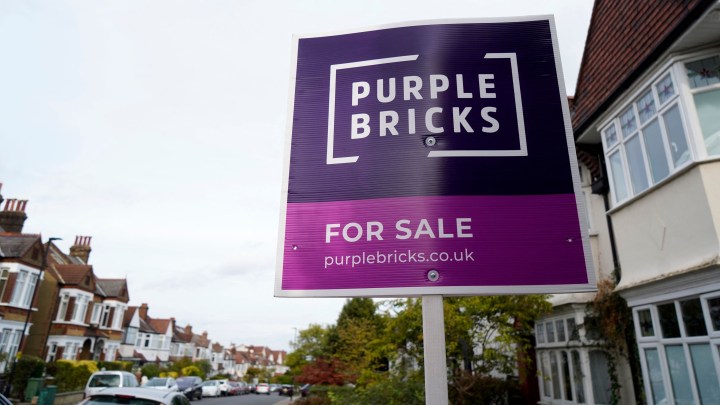
How the U.K.’s short-term fixed-rate mortgages are causing deep worry
How the U.K.’s short-term fixed-rate mortgages are causing deep worry

The end of the era of easy money has raised the specter of a slump in home prices around the world as central banks raise interest rates to combat inflation and mortgages become less and less affordable, while real estate values remain elevated.
On the face of it, the United Kingdom would seem likely to escape the worst of any downturn. British residential real estate has not risen as fast in value as those of many other countries in recent years. House prices in the U.K. jumped by 22% between the end of 2019 and the summer of 2022, according to the Oxford Economics think tank. U.S. home prices soared 42% for the same period.
But these figures may disguise the vulnerability of the U.K.’s housing market. It’s all a matter of the nature of mortgage lending.
The Brits typically fix their mortgage interest rates for much shorter terms than Americans. The recent market turmoil that followed the unveiling of a notorious mini-budget by former Prime Minister Liz Truss demonstrated how precarious this form of housing finance can be.
Twenty-six-year-old Alex Nunn knows that only too well. He’s buying his first home just north of London on a $280,000 mortgage, with an interest rate of just over 3% fixed for two years. That term is due to expire early next year, and Nunn was expecting to refinance at a moderately higher rate.
But then came the U.K. government’s mini-budget with its plan for unfunded tax cuts, which spooked financial markets and sparked a big hike in U.K. interest rates. Suddenly, Nunn faced the possibility of his mortgage repayments almost doubling.
“We could be in a position where we can’t afford to pay our mortgage,” he said. “That’s why it’s so worrying at the moment. It’s the not knowing, it’s the uncertainty of what’s to come. Of course, when you take out a loan like this, you know there is the potential for the rates to go up — but not to this level.”
Thirty-four-year-old Bianka Hamdaoui is also concerned. Her two-year fixed-rate mortgage expires next year, and she could face paying well over double what she pays now. Combined with the sharp rise in the general cost of living — the U.K. inflation rate is 10.1% — Hamdaoui finds the mortgage increase very hard to handle.
”Since the mini-budget, my mind has been in overdrive,“ she said in an interview with the BBC. “I don’t know what I will do. I have been thinking about extreme situations, such as moving back to my parents and letting my place out so that I can keep it. I’m just running out of options.”
Mortgage rates have edged down since the mini-budget was scrapped and the new prime minister, Rishi Sunak, has promised to rectify the “mistakes“ of his predecessor.
But the turmoil has underlined how quickly many British homeowners will feel the effect of higher interest rates as their short-term fixed rates expire. Three-quarters of outstanding British mortgages are on a two- or five-year term. Neal Hudson, an analyst with the housing research group BuiltPlace, estimates that more than 100,000 Brits will be getting a nasty jolt each month.
“It’s going to be a big shock for people whose fixed-rate mortgage is ending,“ Hudson said. ”A lot of people will find themselves coming off really low rates in a much higher mortgage rate environment.”
But why haven’t the Brits opted for much longer fixed-rate terms, like 30-year American deals, so that fewer people face a refinancing crunch? The answer, Hudson said, is that short-term deals have been much cheaper. And as interest rates declined in the past, homeowners could refinance at lower and lower rates.
“I think it’s actually built into the British psyche that mortgage rates continue to go down, and so you might as well have a short, fixed-rate period and benefit from it,” he said. “We’ve had a lot of people who’ve benefited quite nicely over the past decade tracking the ever-falling interest rate downwards.”
Those days have now come to an abrupt end — and that will have consequences for the wider economy, said Samuel Tombs, chief U.K. economist with Pantheon Macroeconomics.
“Make no mistake about it, this is a huge shock to household disposable incomes, and we will see that contribute to a U.K. recession next year,” he said.
The possibility of mortgage repossessions and forced sales by distressed homeowners do suggest lower house prices. But Tombs doesn’t believe there will be a crash.
“I think we’re looking at a correction rather than an outright collapse,” he said. ”We’re expecting a decline of around 8% over the next year. But the big increase in the percentage of household income that will be devoted to mortgage repayments is definitely going to squeeze other parts of the economy.”
Some other forecasters are more pessimistic, with two of them predicting a fall in house prices of up to 15%. Due to the prevalence of short-term fixed-rate mortgages and the political uncertainty still engulfing the U.K., British homeowners have every reason to feel at least a little nervous.
There’s a lot happening in the world. Through it all, Marketplace is here for you.
You rely on Marketplace to break down the world’s events and tell you how it affects you in a fact-based, approachable way. We rely on your financial support to keep making that possible.
Your donation today powers the independent journalism that you rely on. For just $5/month, you can help sustain Marketplace so we can keep reporting on the things that matter to you.











